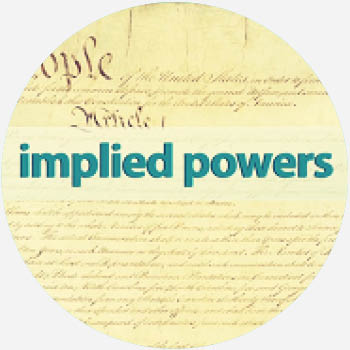5 Implied Powers

The concept of implied powers is a fascinating aspect of constitutional law, particularly in the context of federal governments. It refers to the idea that a government has the authority to take actions that are not explicitly stated in its constitution but are necessary to carry out its explicitly stated powers. This doctrine is crucial for the effective functioning of a government, as it allows for flexibility and adaptability in the face of unforeseen circumstances or changing societal needs.
Historical Context and Development
The doctrine of implied powers has its roots in the early days of constitutional governance. In the United States, for example, the concept was first articulated by Alexander Hamilton in his argument for the constitutionality of a national bank. Hamilton argued that while the Constitution did not explicitly grant the federal government the power to charter a bank, it did grant the power to regulate commerce and declare war, among other things. He contended that the power to charter a bank was necessary and proper for carrying into execution the powers vested in the federal government.
This argument was later upheld by the Supreme Court in the landmark case of McCulloch v. Maryland (1819). The Court ruled that the Constitution gives the federal government certain implied powers that are necessary to carry out its explicitly stated powers. The Court’s decision has had a lasting impact on the interpretation of constitutional powers and has been a cornerstone of federal authority in the United States.
Types of Implied Powers
Necessary and Proper Clause: Perhaps the most well-known source of implied powers, the Necessary and Proper Clause (also known as the Elastic Clause) is found in Article I, Section 8 of the United States Constitution. It grants Congress the power to “make all Laws which shall be necessary and proper for carrying into Execution the foregoing Powers, and all other Powers vested by this Constitution in the Government of the United States, or in any Department or Officer thereof.” This clause has been interpreted broadly to allow the federal government to take actions that are not explicitly listed in the Constitution but are necessary for the execution of its enumerated powers.
Inherent Powers: These are powers that a government is assumed to possess due to its very nature as a sovereign entity. Examples include the power to negotiate treaties, the power to declare war, and the power to regulate foreign affairs. These powers are not always explicitly stated in a constitution but are considered essential for the government to function as a sovereign state.
Residual Powers: Also known as police powers, these are powers that are not delegated to the federal government and are therefore reserved to the states or the people. While the concept of residual powers might seem to be about the limitations of government rather than implied powers, it often comes into play in discussions about the balance of power between the federal and state governments.
Extraordinary Powers: These are special powers that a government may invoke in times of crisis, such as during a war or a national emergency. Such powers are often implied rather than explicitly stated, as they may not be foreseen at the time of constitutional drafting.
Sweeping Powers: This refers to the broad interpretive powers often wielded by courts, particularly the Supreme Court in the United States. Through judicial review, courts can imply powers to the government based on their interpretation of constitutional provisions and legal precedents, effectively expanding the scope of government authority.
Implications and Controversies
The concept of implied powers has significant implications for the balance of power within a government and between the government and the governed. While implied powers can enhance the government’s ability to respond to challenges and achieve its goals, they can also lead to concerns about constitutional overreach, individual rights, and the concentration of power.
Critics argue that implied powers can be used to justify expansions of government authority that were not intended by the constitution’s framers, thereby undermining the rule of law and democratic accountability. On the other hand, proponents argue that implied powers are essential for the effective functioning of a modern government, allowing it to address unforeseen problems and adapt to changing circumstances in a way that strict constitutional literalism cannot.
Conclusion
In conclusion, implied powers are a cornerstone of constitutional governance, enabling governments to respond to the exigencies of the time and to fulfill their constitutional mandates effectively. The doctrine, however, requires careful balancing to prevent abuses of power and ensure that the expansion of government authority is consistent with the principles of democracy and the rule of law. As societies and governments continue to evolve, the concept of implied powers will remain a critical area of debate and refinement in the pursuit of effective, accountable, and just governance.
FAQ Section
What are implied powers, and why are they important?
+Implied powers refer to the authority of a government to take actions that are not explicitly stated in its constitution but are necessary for carrying out its explicitly stated powers. They are crucial for the effective functioning of a government, allowing for flexibility and adaptability in the face of unforeseen circumstances.
How are implied powers different from inherent powers?
+While both implied and inherent powers are not explicitly stated in a constitution, implied powers are derived from the necessary and proper clause or similar provisions, enabling the government to carry out its enumerated powers. Inherent powers, on the other hand, are assumed to be possessed by a sovereign government, such as the power to negotiate treaties or declare war.
Can implied powers lead to abuses of authority?
+Yes, implied powers can potentially be used to justify expansions of government authority that may not align with the intent of the constitution’s framers or the will of the people. Therefore, it is crucial to have mechanisms of accountability and judicial review to prevent such abuses.
How do courts interpret implied powers?
+Courts, particularly the Supreme Court in the United States, interpret implied powers through the lens of constitutional provisions, legal precedents, and the principle of necessary and proper. Their decisions can significantly influence the scope of implied powers and their application in governance.
What role do implied powers play in times of crisis?
+In times of crisis, such as wars or national emergencies, implied powers can be particularly significant. They allow the government to take swift and decisive action that may not be explicitly authorized by the constitution, thereby enabling a more effective response to the crisis at hand.
Related Terms:
- Implied powers examples
- Inherent powers definition
- Implied powers in the Constitution
- Enumerated powers definition
- Implied powers in a sentence
- Implied powers of Congress



